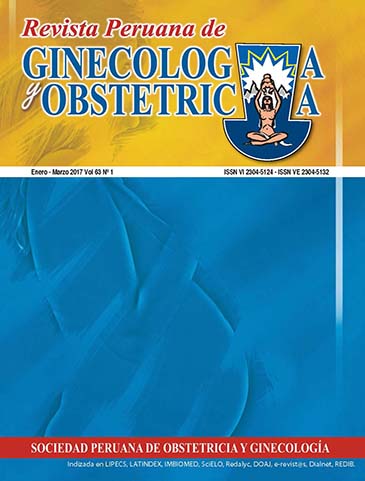Obstetrical hysterectomy at Hospital San Bartolome, Lima, Peru 2003 – 2015
DOI:
https://doi.org/10.31403/rpgo.v63i1961Abstract
Objectives: To determine the incidence, associated factors and outcomes of obstetrical hysterectomy. Design: Retrospective, descriptive, analytical and cross-sectional study. Setting: Hospital Nacional Docente Madre Niño San Bartolome, Lima, Peru. Material: Clinical records of 69 patients who underwent obstetrical hysterectomy (OH) performed between January 1, 2003, and December 31, 2015. Methods: Odds ratio was applied as measure of association, and Excel 2013 and SPSS programs were used for statistical analysis. Main outcome measures: Incidence, associated factors and outcomes of obstetrical hysterectomy. Results: OH rate was 0.69/1 000; 82.6% followed cesarean section delivery (1.94/1 000), OR cesarean section/vaginal delivery was 19.91; 65.2% were multiparous women aged 35 or less, 78.2% with prenatal control. Main diagnoses were placenta previa (27.5%) and previous cesarean section (15.9%). Main indications for OH were uterine atony and placenta accreta (either 39.1%). In 47.8% of the cases, cesarean section-hysterectomy was performed, and supracervical OH represented 55%. Admission to ICU was necessary in 84% of cases, 91.3% needed blood transfusion. Complications during surgery occurred in 18.7%, and 15.9% needed reintervention. No maternal death was reported. Conclusions: In this study, obstetrical hysterectomy had a low incidence (0.69/1 000 obstetrical events), but remained a critical and mutilating circumstance. The risk of obstetrical hysterectomy was 19.9 times higher with cesarean section than with vaginal delivery (OR: 19.9; 95%CI, 8.6-46.2). There was no maternal death in this series.Downloads
Download data is not yet available.
Downloads
Published
2017-04-19
How to Cite
Ramírez Cabrera, J., Cabrera Ramos, S., Campos Siccha, G., Peláez Chomba, M., & Poma Morales, C. (2017). Obstetrical hysterectomy at Hospital San Bartolome, Lima, Peru 2003 – 2015. The Peruvian Journal of Gynecology and Obstetrics, 63(1), 27–33. https://doi.org/10.31403/rpgo.v63i1961
Issue
Section
Artículos Originales
















